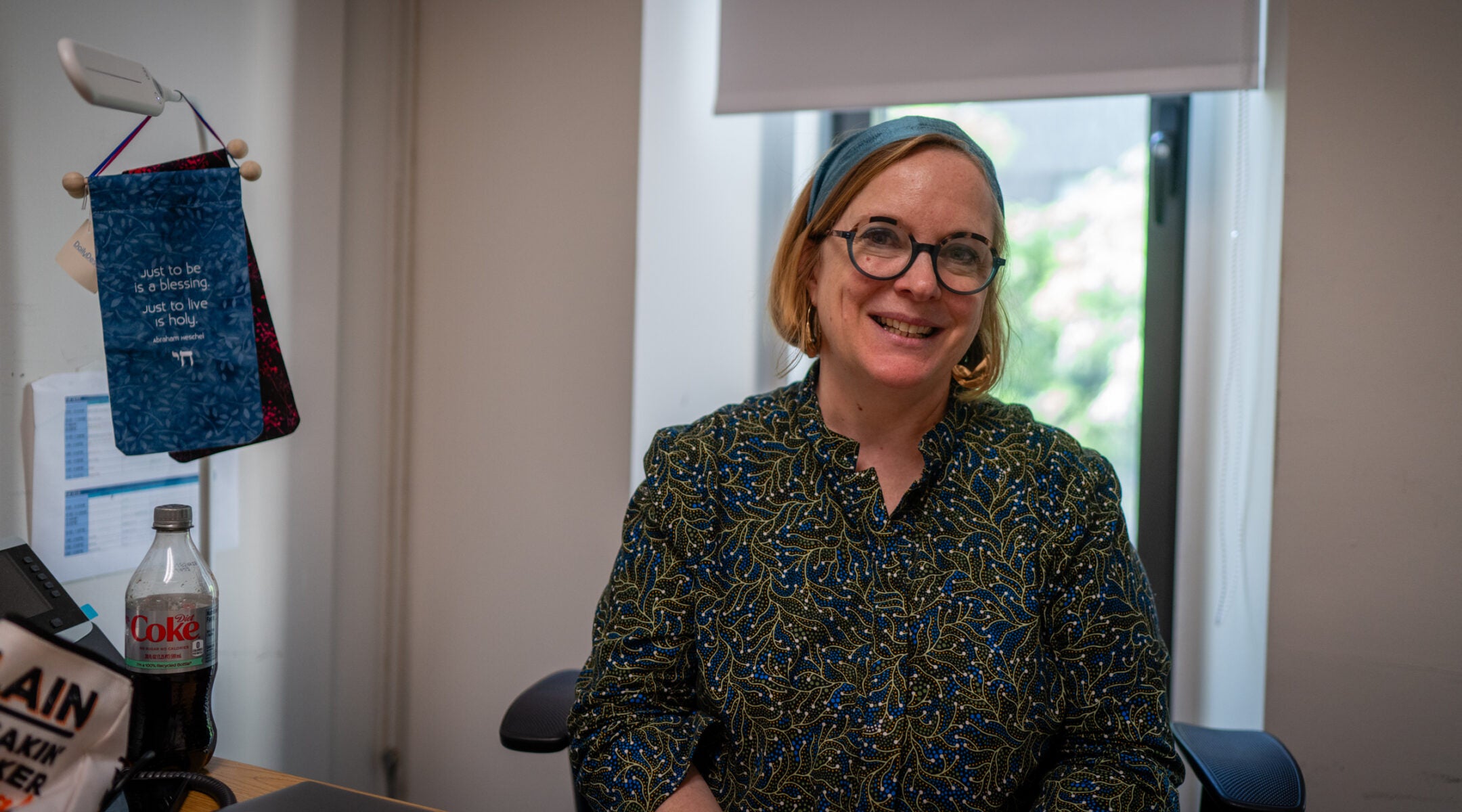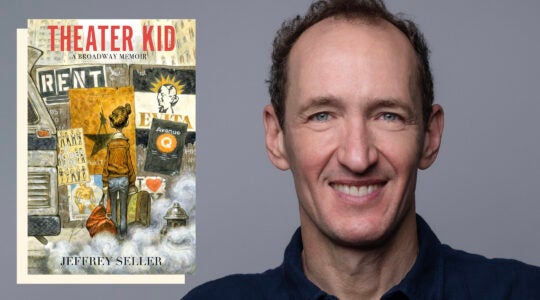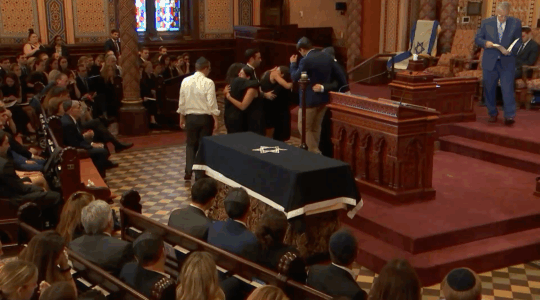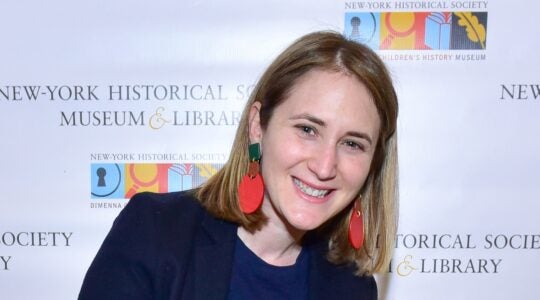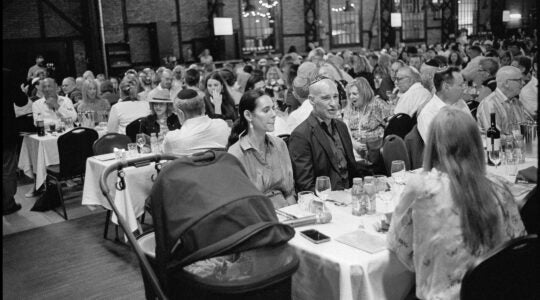To get to Rabbi Katja Vehlow’s office, one must pass a stately church with a turret and belfry outside the university entrance. Nearby, in a campus courtyard, a path wends its way past a 15-foot, 2,400-pound sculpture of St. Peter casting a fishing net.
After proceeding down a hallway lined with portraits of men wearing the long black robes of the Catholic Church’s Jesuit order, visitors arrive at the door of the first Jewish chaplain in the 183-year history of Fordham University, one of the largest Catholic educational institutions in New York City.
“I love being Jewish, I love being with people. I want to co-create sort of expressions of joy, of Jewish joy, here on campus,” said Vehlow, who began the job on May 1, making this fall her first full semester. “I’ve missed being with students. It’s fun to see what people are wrestling with.”
Vehlow arrived at Fordham’s Lincoln Center campus at a tumultuous time for students in New York City, as protests over the Israel-Hamas war convulsed other Manhattan schools including Columbia, City College and New York University. And it means she gets to fashion the role of being a campus rabbi at Fordham — a prospect she relishes: The school’s Jesuit principles resonate with her, and she’s excited by the inherently interfaith work of Jewish ministering in a Catholic space.
“I think there’s been a lot of discomfort for a lot of people, Jewish students, non Jewish students. I’ve heard of relationships that have frayed. I have also seen that there is a lot of effort made by people who work here, but also by students to really connect,” she said. “I hope that we can continue to work on that, on relationship building.”
Vehlow described taking the chaplain job as a “homecoming into a place I don’t know yet.” She was training to be a hospital chaplain in the emergency department at Maimonides Medical Center when several friends sent her the Fordham posting.
The job appealed to Vehlow, who was ordained by the Jewish Theological Seminary, a Conservative institution, in 2022: Working as the university’s first Jewish chaplain would allow her to tie together several parts of her life, including her love of chaplaincy, Jewish life, working with students, her past experience in academia; and her own Christian upbringing.
She grew up in a Protestant household in southern Germany and converted to Judaism in 2001 after a stint studying at Hebrew University in Jerusalem. She got a PhD in medieval history, taught religious studies at the University of South Carolina, then decided to attend rabbinical school. She was ordained by the Jewish Theological Seminary in 2022.
“I was totally shocked,” she said of receiving the job offer. “I had always hoped to be a campus chaplain, but I never thought I would be one.”
The university has around 16,000 students between its three main campuses in Manhattan, the Bronx and Westchester. It was founded on Jesuit principles, but only around 45% of students are Catholics, Vehlow said. According to Hillel International, there are around 500 Jewish students between the undergraduate and graduate programs.
The university already has a center for Jewish studies, and a Jewish Student Organization runs Shabbat dinners and holiday celebrations at the Manhattan and Bronx campuses. There is some kosher food, such as salads and sandwiches, available in campus dining.
Only weeks into the school year, Vehlow is focusing on getting to know students and the university, and supporting the Jewish student community by joining students for Shabbat dinners and organizing high holiday programs. In her conversations on campus, she has mostly heard that Jewish students are comfortable at the university and want to “see more established Jewish life, like Shabbat dinners, high holidays.”
Senior Reyna Stovall, the student president of the Manhattan campus Jewish Student Organization, said Vehlow’s appointment was a “huge deal” for Jewish students. Stovall has met with Vehlow regularly, attending “lunch and learn” sessions the rabbi hosts that discuss topics such as holding a shiva, the Jewish mourning ritual.
“It’s created such an environment of inclusivity and just Jewish presence on campus that did exist before, but not in the same way,” Stovall said. “Because we have a rabbi on campus now, our voices are heard at a different level than they might have been before, because there’s somebody just for us.”
Part of the Jesuit philosophy, and Fordham’s, is the tenet of “cura personalis,” Latin for “care for the whole person.” The school aims to foster emotional and spiritual wellness in students, including by providing opportunities for religious instruction – whether in Christianity, Judaism, Islam, or other doctrines.
In addition to hiring Vehlow, the university hired its first campus imam this year, Ammar Abdul Rahman. His office is next to Vehlow’s in the campus ministry building, which also houses staff who support Catholic and LGBTQ student needs. (Vehlow said she and Rahman are planning interfaith events, such as an open conversation on the role of fasting in religion, on the patriarch Avraham, and joint trips to a synagogue and a mosque.)
“Fordham was founded at a time when neither Catholic nor Jewish immigrant students were particularly welcome at other universities. We have always proudly been a center for both, focused on our intertwined religious traditions,” university president Tania Tetlow said in a statement to the New York Jewish Week. “Having a rabbi as part of our campus ministry team helps us do more to support the spiritual and emotional needs of our Jewish students, faculty, and staff.”
The university requires students to take one or two classes in religious studies, which are not necessarily Catholic, as part of the core curriculum, and many non-Jewish students opt for classes in the Jewish studies department, Tetlow said. Vehlow said all events are open to non-Jewish students, some of whom attend.
“We have a lot of people who have been touched by Judaism, whether it’s a family connection or a personal connection, whatever it may be, and everybody is welcome,” Vehlow said.
Vehlow said her Christian background is an asset in the new role. She is familiar with the culture, had Jesuit family friends growing up, and has studied Jesuit thought. That knowledge will help her “stepping into this as a Jewish chaplain and as a rabbi who wants to make Judaism more visible” on the traditionally Christian campus, she said.
The Jesuit philosophy, she added, “means taking care of the whole person, so the realization that we’re not just sort of machines sitting behind a computer, but that we have souls and that college can be a really good opportunity to think about who we are and who we want to be.”
She is planning discussions for students such as “what does it mean to be Jewish at a Jesuit university,” and student-led conversations with non-Jewish classmates about being Jewish, she said. During the holiday of Shavuot this past June, she handed out pieces of cheese, a staple of the holiday, at the entrance to the school.
“It’s better than many other places because they’re very into God and the more you are into God, if you are a religious institution, the more likely you’ll be happy with having Jews or Muslims or whoever,” said Ilya Bratman, who heads several Hillel chapters around the city, and has been operating an informal Hillel at Fordham for five years that counts about 50 student members. “The more devout people are, the more likely you’ll have a good relationship with them.”
He said Jewish students come to Fordham mainly due to its reputation as a good school, rather than for religious reasons. He praised the university’s Jewish studies department and said that its location in New York City offered ample opportunity for Jewish life.
“People don’t choose Fordham because there’s crosses in the room,” he said.
There is some anti-Israel friction on campus, as at other colleges, Bratman said. Last spring, demonstrations there were smaller than at other city colleges, such as Columbia and some of the CUNY campuses. The first thing Vehlow did after starting the job in May was to introduce herself to demonstrators at a small anti-Israel protest encampment.
“I said, ‘Hi, I’m Katja. I’m the new campus rabbi. I’m here to listen, I’m here to observe, I’m here to support as much as I can.’ And it was fine. People nodded and said ‘Hi,’” she said. The discussions were brief but cordial, she said, and she has not heard any reports of antisemitism from students or campus security.
Mariano Serber, a Jewish sophomore who is active in the Hillel, said Fordham’s Jesuit traditions had helped forestall some of the anti-Israel activism that rocked other New York Universities last year. Several years ago, Fordham won a legal battle to avoid granting recognition to its chapter of Students for Justice in Palestine.
“Fordham is a private institution, a Jesuit institution, and according to Jesuit values, there is no place for violence or terror or hate speech. Instead, Jesuit values foment the learning of other cultures and other traditions and other religions,” Serber said, adding that a Jesuit priest had chatted with Jewish students at a recent Shabbat event.
“They’re great. I have coffee with them every Thursday morning,” Serber said of the Jesuit priests. “I’ve had great conversations with them. I see the father walking around, whenever I see him, ‘Good morning father, good morning sister.’”
Now, Vehlow is hoping to fill that role as a Jewish leader. She said she has a passion for chaplaincy and helping people though pivotal moments in their lives. “This could be a moment of joy, this could be moments of difficulty or crisis,” she said.
“It’s giving people, basically, the gift of time, and being with them, and seeing where it goes,” she added. “So I do this as a Jewish person.”
The New York Jewish Week brings you the stories behind the headlines, keeping you connected to Jewish life in New York. Help sustain the reporting you trust by donating today.
